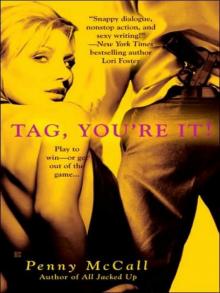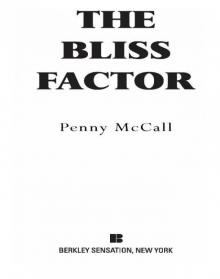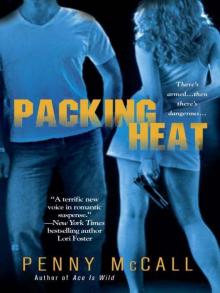- Home
- Penny McCall
The Bliss Factor Page 5
The Bliss Factor Read online
Page 5
“Until I’m sure they can’t follow us.”
“I hope never to anger you to this great a degree.”
“It’s not anger, it’s self-preservation.”
chapter 5
“IT’S ME,” HARRY MOSCONI SAID GRUFFLY WHEN the party he’d dialed came on the line.
“Well? I don’t have all day. Give me a progress report.”
“There’s no progress to report. We tried to snatch Larkin again, but he fought us off. With a red-hot poker and a sword.” Harry studied the scorched and puckered skin on the back of his hand. He chose not to look at his car.
“He still thinks he’s Lancelot?”
“Yeah.”
There was a heavy sigh from the other end of the conversation, the kind of sigh that told Harry he’d fucked up again. Like he needed a two-bit criminal in a five-hundred-dollar suit to tell him that.
“What was we supposed to do, let him turn us in to whatever agency he works for?” he said, hating the whiny note of defense in his voice.
“You should have called me before you did anything.”
He should have had his head examined a year ago, before he’d gotten involved in this stupidity. Not that he’d known what he was getting into at first.
It had started out as a courier job, picking up boxes at various Renaissance faires around the Midwest and bringing them back to Detroit. Why one of the established shipping companies wasn’t used Harry hadn’t understood, but he hadn’t asked any questions, either. Getting laid off from the auto plant where you’d worked for twenty years, and facing the loss of everything you’d worked for, did that to a guy. Jobs had been few and far between, especially for a man with a lot of debt and not a lot of education. Just making his mortgage payment each month had felt like a major accomplishment.
The new job had involved a lot of driving and nights away from his family, but it had paid well, and the work was easy. He and Joe Salerno had shared the driving in the beginning, spending a lot of time together and getting to be friends. Six months ago Joe had brought in his cousin, Kemper Salerno. Kemp was dumb as a box of rocks, and he wasn’t up to anything much physical—unless it involved consumption—but he could follow instructions, he didn’t ask questions, and he liked to drive, which allowed them to keep up with the ever-increasing workload.
Harry was the one who’d fucked up a good thing. He hadn’t done it on purpose, but that didn’t make it any less fucked up. Accidentally getting a glimpse of the printing press, putting that together with the size and shape of the packages, and coming up with counterfeit bills had been bad enough. Confronting the guy behind the crime had been downright stupid. True, he’d wanted to be sure he wasn’t getting screwed over, not to mention duped into passing bogus bills because he’d been paid in them.
His peace of mind had come at a high cost, though. He was getting paid in real bills, but he knew about the crime, and he hadn’t gone to the police. That made him part of it, and it was too late to back out, even when the boss started asking him to do other things. Like hurt people.
“Hello, are you there?”
“We tried to call you,” Harry said, checking back into the conversation. “You was busy, and we couldn’t wait.”
“And look how things turned out. If you’d finished him off—”
“You told us not to hurt anybody, just keep an eye on them. We was gonna question him, find out how much he knew and who sent him.”
“So you knocked him out and then left him for the first Renaissance kooks who wandered by. Which just happened to be the Blisses.”
“Yeah, well, you ain’t seen this guy,” Harry grumbled. “He’s practically seven feet tall and he ain’t no feather-weight. Me and Joe went to find something to haul him in, and when we got back he was gone. Didn’t take long for us to figure out where he was. We shoulda just gone to that stupid trailer and—”
“No! We need the Blisses. This thing goes south, they’re on the hook, just like the rest of their goofball friends. If you’d told me who you thought Larkin really was, I would have shut down the operation.”
Harry breathed a sigh of relief, and then the would have part of that comment sank in. “Why don’t you shut it down now?”
“As long as Larkin’s in fantasyland there’s no reason to. Besides, if he’d had any concrete evidence he’d have called in whatever agency he works for by now. One more big score, that’s all it will take, and then we won’t need him anymore. We won’t need any of them.”
“What are you saying?”
“Don’t be an imbecile—that means stupid.”
“I know what it means. And I don’t appreciate being talked to like I am one.”
“Or what? You’re as deep into this as I am. If Larkin gets his memory back and calls in reinforcements it will only be a matter of time before we all go to jail.”
“Why can’t we just snatch him, like I wanted, and find out who he works for? Maybe he’s just a nosy SOB, not a fed or DEA. Could be you’re just paranoid—that means jumping at shadows.”
“Don’t be smart. It doesn’t work for you.” The voice turned colder, but with an undercurrent of weary fatalism. “You’ll do what’s necessary. We all will. And after we make an example of Larkin we won’t have to worry about the others staying in line.”
What’s necessary. Translation: He wanted Larkin dead. He just didn’t want to say it in so many words. That way if anything went wrong he could put it on them.
Like hell, Harry thought. He hadn’t gone to college, but that didn’t mean he was stupid. “He don’t even remember what’s going on.”
“He will.”
“I didn’t sign up for this. I just wanted to save my house from being foreclosed, make sure my kids have a roof over their heads.”
“Just do it or we all get new living arrangements. I don’t know about you, but I don’t want to wake up one day and find out my new roommate thinks orange is my color.”
Harry heaved a sigh. “Good point. But this is it.”
“Yes, I agree. Just one more big push and then we shut it down.”
“Whatever,” Harry said, accepting the fact that he was well and truly stuck. Forward wasn’t the direction he wanted to go, but there was no turning back now. “I need an advance.”
“Another advance, you mean.”
“If you want me to deal with Larkin I’m gonna need my car fixed. It ain’t in the best shape right now.”
There was another heavy sigh, this one long-suffering. “Very well.”
Harry disconnected before the urge to smash something got too big to resist. The only thing handy was his cell and they cost.
Joe stood a couple feet away, chewing on a thumbnail and looking anxious, like always. Kemp was in the Honda, parked a little way off, looking like it belonged in a salvage yard, thanks to the fine members of UAW Local 594. And Connor Larkin. The Honda idled rough enough to make the whole car shimmy, the motor coughing every now and then, a little curl of smoke seeping out from under the hood each time. Things couldn’t get much worse, Harry thought, and then the sideview mirror fell off. He turned to Joe, who jerked back a couple of steps.
“I look that pissed off, huh?” Harry asked him.
“Scary is more like it,” Joe said, but he relaxed back to his perpetual case of low-grade anxiety. He gestured at the phone fisted in Harry’s hand. “You didn’t tell him Larkin left the nutfest.”
“He don’t want to know where Larkin is,” Harry said, putting that particular humiliation away. For the moment. “He just wants us to take care of him.” Kill him, Harry qualified in his own mind, because saying it out loud would put Joe into a full-blown panic attack, and he didn’t have the time—or the paper bag—for that.
Besides, if the guy calling the shots wanted to keep his instructions vague in order to protect himself, well, that left Harry free to interpret those instructions any way he saw fit, right? “He doesn’t want any of the details, and it’s not like he’s keeping us in the
loop,” Harry said to Joe. “And what he don’t know won’t hurt him.”
“Yeah.” Joe exhaled heavily, running a hand back through his graying mullet. “But—”
“That Hummer had dealer plates. We won’t have no trouble finding them.”
“Then what?”
“I don’t know,” Harry said. “I’m making it up as I go along.”
RAE CONSULTED THE GPS AGAIN, LETTING IT NAVIGATE her out of Pontiac, heading toward Grosse Pointe. She drove silently, embarrassed. Sure, she’d needed to keep the guys in the Honda from following them home, but she shouldn’t have enjoyed their comeuppance quite so much. Conn chuckling every now and then didn’t help matters.
“Men always get off on violence,” she grumbled.
“Get off?”
“Uh . . .” She stalled, the true meaning of that phrase popping into her head, not to mention a mental picture that made her cheeks burn. “It means you find pleasure in it.” Orgasmic pleasure, but he didn’t need to know that.
“Violence is often necessary,” he said with a shrug, “and sometimes entertaining. That was both.”
Rae smiled, reluctantly. “It was kind of funny.”
Conn laughed outright, long and deep and full of a joy that warmed the cold, empty places inside her. She’d always been a loner, but it suddenly occurred to her that she was lonely, too.
Connor Larkin was a remedy she could not afford. Even if he was the remedy she wanted to try.
“They screamed like helpless women,” he said, shoving her back to her center, even if she couldn’t quite believe it was the well-adjusted place she’d once thought.
“That’s insulting.”
“You, Rae Bliss, are not helpless.”
She wasn’t delusional, either. A man like Connor Larkin would be company, sure, but only for as long as he chose. She needed stability, permanence, or at least the faith that she wouldn’t wake up to find him gone one day because his own wanderlust was more important than what he might feel for her.
“You’re going to find that most women aren’t,” she said firmly, “but thank you. And it’s not Bliss.”
“It could be.”
Bliss. If he kept looking at her like that . . . A horn blared, she dragged her eyes back to the road, and let it go, at least outwardly. Inwardly it was World War III, reality fighting with fantasy. Reality had gunshots and vehicular assault on its side, but Connor Larkin was right there, and his physical impact was more than enough to make her body forget that kind of visceral fear. Even more frightening, it could make her forget herself. “It’s Blissfield,” she said, her barriers going back up. “I changed my name.”
“Why?”
Good question, she thought, her reasons not as clear-cut as they’d once been. “It made perfect sense at the time.”
“To deny your heritage?”
“That’s not why I did it.”
“Was it not?” he asked, the same question sneaking in around the cracks in her own certainty. “Your parents are good people.”
“Of course they are, but I hated that name.” She shuddered. “Sunshine Bliss. It’s just not me. And that life . . . It’s no way to raise a kid.”
“So they should have sacrificed everything for their child, settled somewhere and been miserable by denying their own desires?”
“Yes—no—I don’t know. And it’s really none of your business.”
He nodded, but Rae couldn’t stop thinking about it. She’d changed her name as a way to distance herself from her parents’ life and all the unhappiness of her childhood. But had she done it to distance herself from her parents, as well? And had it been more than teenage rebellion? Had she wanted to hurt them, to make them understand how much she’d hated being dragged along on their gypsy travels?
“You’re supposed to be from the sixteenth century,” she said, annoyed that he kept putting her off balance.
He looked at her, one eyebrow cocked.
“It wasn’t a time period known for turning out sensitive men.”
He shrugged, and this time she was only too happy to let him blow off the subject. She whipped off the highway at the first exit she came to, made a couple of quick lefts, and got back on going the opposite direction.
Conn twisted around, peering out the back window.
“There’s no one following us,” Rae said. “That’s the whole point. This is the best time to go back to the Renaissance festival and try to figure out why you’re a target.”
And okay, the closer they got to her house the more nervous she became. The Hummer was a whole lot smaller, but there was an intimacy to having him in her home, where she ate and lived. And slept. If she could wrap this thing up today, without the cops’ and her parents’ interference, she could go back to her life and pretend none of this had happened.
Right, and the IRS would suddenly take an understanding approach to delinquent taxpayers. There was no way she’d forget Conn, and that kiss, in her lifetime. The man left an indelible impression. Like a lobotomy.
“DID YOU SAY SOMETHING?”
Conn smiled a little. “That was my stomach growling.”
“Missed lunch in all the excitement, huh?”
“I rarely eat when there are crowds.”
Rae glanced over at him. “Why not?”
“Women,” Conn said, “then men, then trouble.”
“Come again?”
He frowned. “When was the first time, and how did I miss it?”
Rae’s face flushed, and she glared at him, clearly not comfortable with her sexuality, which was a shame for any woman but especially for one Conn was so attracted to.
“Stop it,” she said. “Whatever’s going on in your mind, cut it out.”
“My mind is not the problem. Yours is. You should spend less time thinking and more time enjoying.”
She chose to ignore his remark. “The phrase ‘come again’ means I didn’t understand what you said, so please repeat it.”
“Oh, uh,” Conn said, scrambling to remember his place in the conversation, which meant getting his mind out of his breeches, “women, then men, then trouble. When I go into the crowds—”
“The women get all worked up, their husbands or boy-friends get jealous, and you get in a fight?”
“Not me, them. Marital strife is an ugly business.”
“So you going hungry is a public service,” Rae said.
“Aye.”
Rae shook her head, smiling at him. “I’m sure my mother would bring you lunch.”
“Annie and Nelson have their own concerns. I attempted to hire one of the food purveyors to deliver my midday meal, but that created other problems.” Even when he’d paid a young man, the duty had been usurped by a woman, which invariably became sticky, so he chose not to even give the appearance he was favoring one of the young women over another.
“Women can be like that,” Rae said, seeming to understand.
She eased the Hummer into the center of the road, bounded by yellow lines, turning when traffic cleared into a narrow parking lot surrounding a building made mostly of glass. The sign proclaimed it a Scottish establishment.
“I will take the eggs,” Conn said to Rae.
“They stop serving breakfast at ten thirty.”
Hmmm, Conn mused, no Scotch eggs. “Perhaps an oatcake would be good, then, but not haggis. I like the Scottish—”
“They’re very bloodthirsty,” Rae put in.
“Precisely. But their common nourishment leaves something to be desired.”
“The only thing this place leaves to be desired is nutritional value.”
She pulled around the building, stopping next to a large sign displaying their options and rolled her window down. Conn leaned across her so he could see all the pictures on the board, but then looked at Rae instead, his eyes meeting hers, their mouths a whisper away, before he said, “You choose.”
Neither of them believed he was talking about the menu.
Rae’s lips pa
rted, her breath slipping out on a soft moan. Conn leaned in, slowly, savoring the beat of his heart thudding against his ribs, the feel of his blood rushing through his veins, slow and hot, those seconds of anticipation, remembering the taste and feel of her mouth, and already knowing this kiss would put that first one to shame—
“AnIakeoror-er?”
Rae jerked back and sucked in her breath.
Conn stayed where he was, in front of Rae, searching for the source of that garbled voice, yet finding no one.
“It’s the speaker,” Rae said, a bit breathless but her voice even enough that Conn fought harder to compose himself.
He managed it, barely. “Aye, someone is speaking,” he said, “but where is he?”
Rae sighed. “What do you want?”
Conn searched her face, not as composed as he’d thought he was.
“To eat.”
He grinned.
“Never mind,” she said, brushing him back with her hand so he had no choice but to flop into his seat.
The voice blared out again, still garbled, still disembodied, but he caught something about orders. The place must be run by soldiers, which made sense since the Scottish were perpetually at war with one another when there was no other enemy to be found.
“We’ll take a Big Mac,” Rae said, talking to the sign, “a fish filet, a chicken sandwich, a chocolate shake, fries, and nuggets.”
“How many?” asked the invisible solder
She slid a glance in Conn’s direction. “Do they come by the gross?”
Ten minutes later, money had exchanged hands and Rae had plopped two paper sacks into Conn’s lap, placed a drink in the cunning holder built into the vehicle, and pulled onto the road again. Conn knew he should be paying attention to their journey, but their attackers weren’t coming after them anytime soon, so his stomach took precedence.
Conn mowed through the sandwiches and fries, slurped down the shake, then paused to study one of the small brown lumps of food in the last container. “What is it?”
“A Chicken McNugget.”
He shrugged, popped one in his mouth, then devoured the rest and searched for more. To his disappointment the bags were empty, but by then they were back at Holly Grove. Rae parked the Hummer in the public lot, and they walked in, bypassing the tourist entrance for the participants’ camp.

 Tag, You're It!
Tag, You're It! The Bliss Factor
The Bliss Factor Packing Heat
Packing Heat Worth the Trip
Worth the Trip